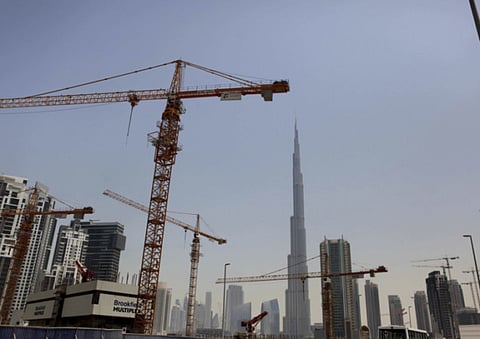Construction rises again
While the construction industry in the Gulf is recovering and currently worth $1 trillion, experts say there’s still a long way to go

The GCC construction industry is making a positive yet cautious turnaround, with the UAE, Saudi Arabia and Qatar expecting good business in 2013, according to industry heads. Business intelligence group Zawya says the ongoing construction projects in the Middle East and North Africa (Mena) are collectively estimated at $4.2 trillion (Dh15.42 trillion).
The UAE represents the biggest slice of that, at $698 billion.
Stakeholders say this year has seen significant launches and announcements of new projects, alongside the revival of existing projects. However, stiff competition and few projects being greenlit will continue to remain the two biggest challenges for the sector.
“The Dubai and Saudi construction markets will witness very strong growth over the next couple of years,” says Bishoy Azmy, Chief Executive, Al Shafar General Contracting. “Abu Dhabi and Qatar are also important markets. But I do not see much movement in Oman, Bahrain or Kuwait.”
He foresees both opportunities and challenges for the next two years. “I expect to see the beginning of a new boom in 2013 and 2014. The industry will face new challenges, including a hike in the price of building materials, which is currently at a low point, and the renewed need to recruit labour from the Asian subcontinent.”
According to Zawya’s August project tracking data, projects worth around $1.08 trillion are in the design, bid or construction stage up to 2037 in the GCC.
There is strong competition at the moment, says Philippe Dessoy, General Manager of multi-services group Six Construct. “Saudi Arabia is our biggest market and we have seen many projects being announced since the beginning of the year. On the other hand, the UAE is a quiet market for our firm. There are too many companies and not enough projects.”
On the architecture front, design work is picking up in the GCC. “In recent months, we have started to see some interesting signs of activity in Dubai, with the launch of some new projects and further launch possibilities,” says Yahya Jan, Vice-President and Design Director of integrated consulting firm Norr Group.
“The activity has been mostly in the multi-family residential sector and hotels, but we are also seeing some movement in the retail sector. The office building segment is still facing a glut.
“We are also seeing developers with unfinished construction moving ahead and completing those projects,” he says.
While he feels that the Abu Dhabi market had slowed down, Jan says it has not yet bottomed out.
“Over the last four to five years, Saudi Arabia has been a very important, strong and deep market for us and it will continue to remain so. We have entered some bids in Qatar, but it is not seeing much activity at the moment.
“Kuwait is also showing signs of revival, but mostly in the residential and hospitality segments, while we are seeing proposals for high-end residential [projects] and hotels in Bahrain.”
A leader in the GCC construction industry, who asked not to be named, says although prices in Dubai have started to improve and have boosted the property sector, it is not helping the construction industry. “We are seeing phenomenal overcapacity, where the supply of new projects is half that of the demand.”
He said that even if the supply increases by 10 per cent, it will still be 40 per cent lower than the demand. Furthermore, even with new projects being announced, companies’ margins will be lower due to stiff competition.
Jan says his firm is seeing many requests for proposals. It expects 2013 to be a good year, if the geopolitical situation becomes calm and stable. “Then we will see a lot of potential in the GCC projects markets. Currently, oil prices are buoyant and so are revenues, but it is a bit of a wait-and-watch situation.
“I would call 2013 a cautiously optimistic year, which will depend on various other factors, such as the outcome of the US elections, the EU issues and other regional political challenges. Yet, I must say that there are also those developers and investors who have learned to live with the situation and continue to move ahead.”
Azmy adds that demand for residential projects will continue in 2013 due to the young and growing population.
“We expect that there will be lot of demand for low-income or mid-income homes in the coming years,” he says.



